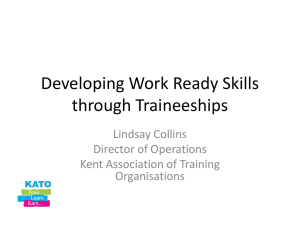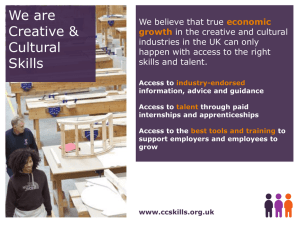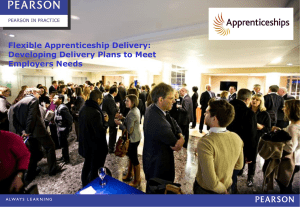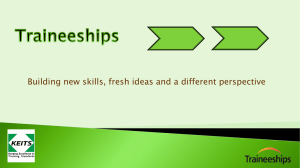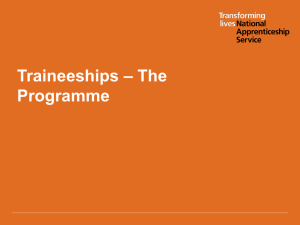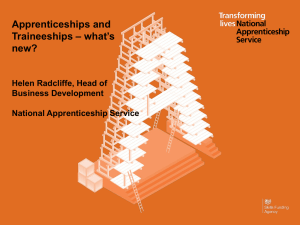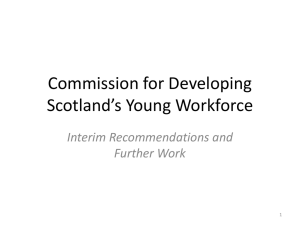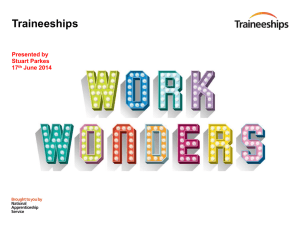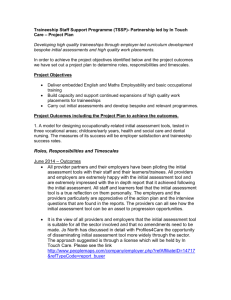Supporting young people to develop
advertisement
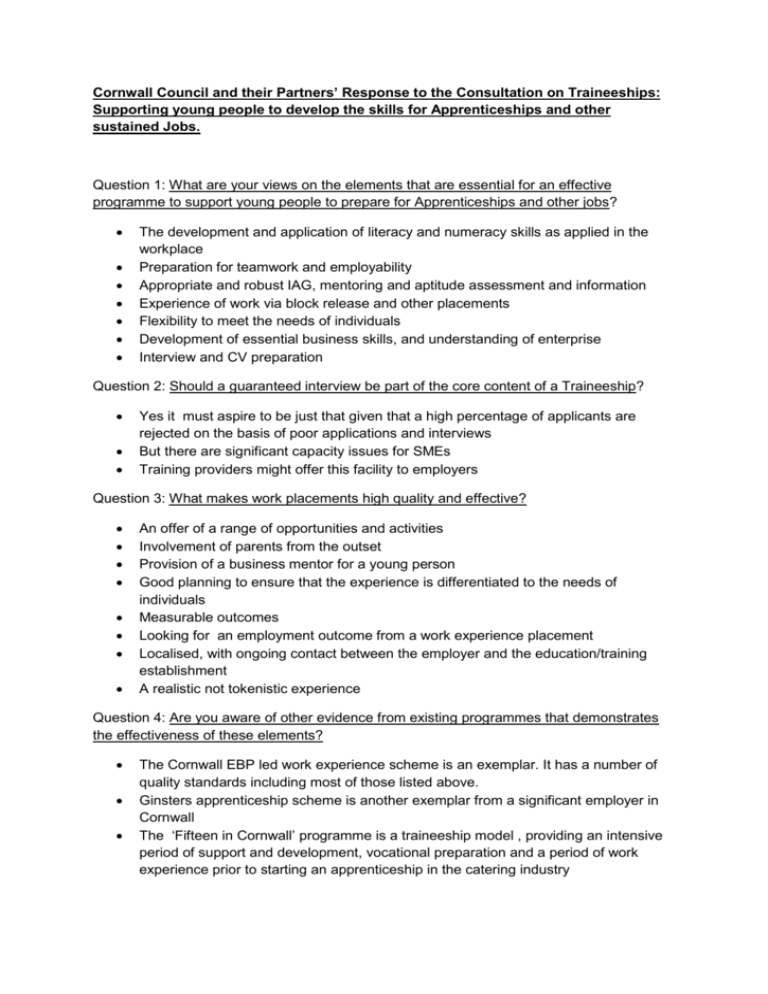
Cornwall Council and their Partners’ Response to the Consultation on Traineeships: Supporting young people to develop the skills for Apprenticeships and other sustained Jobs. Question 1: What are your views on the elements that are essential for an effective programme to support young people to prepare for Apprenticeships and other jobs? The development and application of literacy and numeracy skills as applied in the workplace Preparation for teamwork and employability Appropriate and robust IAG, mentoring and aptitude assessment and information Experience of work via block release and other placements Flexibility to meet the needs of individuals Development of essential business skills, and understanding of enterprise Interview and CV preparation Question 2: Should a guaranteed interview be part of the core content of a Traineeship? Yes it must aspire to be just that given that a high percentage of applicants are rejected on the basis of poor applications and interviews But there are significant capacity issues for SMEs Training providers might offer this facility to employers Question 3: What makes work placements high quality and effective? An offer of a range of opportunities and activities Involvement of parents from the outset Provision of a business mentor for a young person Good planning to ensure that the experience is differentiated to the needs of individuals Measurable outcomes Looking for an employment outcome from a work experience placement Localised, with ongoing contact between the employer and the education/training establishment A realistic not tokenistic experience Question 4: Are you aware of other evidence from existing programmes that demonstrates the effectiveness of these elements? The Cornwall EBP led work experience scheme is an exemplar. It has a number of quality standards including most of those listed above. Ginsters apprenticeship scheme is another exemplar from a significant employer in Cornwall The ‘Fifteen in Cornwall’ programme is a traineeship model , providing an intensive period of support and development, vocational preparation and a period of work experience prior to starting an apprenticeship in the catering industry Within the Cornwall College Group there is substantial investment in staff responsible for the quality of Apprenticeships Question 5: How could Traineeships best complement what is already available for young people, simplify our offer and avoid unnecessary duplication? Ensure colleges and schools are central to local programme delivery Ensure that the work of lead LA level partnerships is sufficiently fine grained to be able to identify overlaps and duplication. Progression opportunities should be made clear to the individual learner at the start of the programme There should be clear linkages to JSP/Work Skills Academies etc Question 6: What are your views on the proposed Traineeships Model? Are the core components right?. Is the balance between flexibility and specification correct? Absolutely right to be flexible within a framework of core themes Functional maths and English and employability should be included Multiple work placements more desirable than a single experience Flexible support should include a relevant vocational qualification, digital skills and communication Question 7: The programme should begin at 14+ to enable young people to be apprentice- ready at 16+ The Young Apprenticeship pathways were hugely effective in giving year 10s a meaningful and engaging vocational pathway Question 8: What are your views on the right age range for the programme? What are your views on the right duration for the programme? 6 months may not be long enough for some learners. A period of 9-12 months may be more realistic Consideration needs to be given to what provision is available locally for those learners who not achieve a positive outcome Question 9: What other elements of flexible content would you expect to be added to the core locally? Experience in some vocational area will mean that trainees may come to them with a range of core skills Business and enterprise skills aspects of Employment rights and responsibilities personal learning and thinking skills a genuine focus on progression Question 10: What are your views on the most effective routes for delivering Traineeships? Do the funding systems set out in Paragraph 27 provide sufficient flexibility to achieve this? There must be an uplift payment to fund the Work Experience element dispersed rural provision will incur extra travel costs and this should be recognised in funding formulae does the flexibility suggested in para 27 mean that there will be additional fun ds available to support additional element s in the programme? Question 11. How can we ensure that Traineeships area high quality route which delivers real progression for young people but minimises bureaucracy for employers and providers? Provide a level of funding that allows the programme to be flexible and personalised Recognise the costs of Rurality and geographical isolation Apart from English and maths, focus strongly on Learning and Skills Development and positive progression Ensure that young people are provided with information about programmes through impartial IAG Have a single provider of paperwork and awards Question 12: The success of Traineeships will rely on employers offering high quality work placements. How can we best support and encourage employers to offer these? What will employers see as the benefits of being involved in Traineeships? Employers will only see the benefits once results have been delivered Employers will engage with the programme if it meets their business need to bring people into their industry, so marketing must be focused and specific The Traineeship programme must invest in infrastructure if it is to reach SMEs who do not have the capacity/skills or scale to write bids No mention of the LEP in the document
